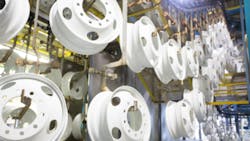Accuride Corporation is introducing a new coating option for its steel commercial vehicle wheels. It said the proprietary Steel Armor™ treatment involves a proprietary three-phase coating process with more corrosion inhibitors that improve “the look and life” of wheels. The manufacturer claimed products treated with the new formulation would have up to two years longer service life than wheels treated with current standard coatings.
In a conference call detailing the new product offering, senior vice president and general manager of the Accuride Wheels and Gunite business Scott Hazlett announced that the company aims to offer coating on all of its steel wheel products by the end of the first quarter of 2014.
Accuride Corp. produces a range of component products for commercial vehicle OEMs, mainly wheel and wheel-end parts, but it also produces cast iron parts for agricultural, construction and mining, and oil-and-gas industry equipment. In addition to the Accuride and Accuride Wheel End Solutions business units, it includes Brillion Iron Works and Gunite.
"The introduction of our revolutionary Steel Armor coating technology ups the ante for steel wheel corrosion protection in the commercial vehicle industry," stated Accuride’s president and CEO Rick Dauch.
Accuride manufactures cast steel and forged aluminum wheels for heavy-duty commercial truck and trailer OEMs, commercial vehicle fleets, and distributors in the commercial vehicle aftermarket.
Since 2011 the corporation has invested an estimated $150 million to update its wheel manufacturing and finishing capabilities. Last June, it announced a $5.8-million plan to expand powder coating capacity for steel wheels at its plant in Henderson, KY. That plant ships more than 10,000 heavy steel wheels daily, and also houses the Accuride Wheels R&D, product development, and testing operations.
Also, the company is expanding powder-coating capability for wheels at a plant in Monterrey, Mexico. Both new coating lines will start commercial production in Q1 2014.
According to Craig Kessler, Accuride’s v.p. - Engineering, Steel Armor improves “sharp-edge protection” on truck wheels, meaning reduced corrosion at the points where rust often forms first, including flanges, hand holes, bolt holes and hub holes on stud- and hub-piloted steel wheels.
Blocking Rust at Point of Entry
The three-phase process includes a zinc phosphate layer, followed by an epoxy electrocoat process, and finally a powder coating surface treatment. The proprietary process was developed by Accuride and an unnamed “channel partner,” according to details revealed in the conference call.
The Steel Armor coating “contains the growth of corrosion by blocking rust at the point of entry when gouges, chips, scrapes and scratches expose the metal,” according to the manufacturer.
To prove the coating’s effectiveness, Accuride subjected wheels treated with Steel Armor to 12 independently performed, corrosion-performance tests. These included salt spray and chip-resistance tests, as well as cyclic corrosion testing methods used in the automotive industry to determine product performance in road and climate conditions, such as UV transmission and Xenon testing.
"Corrosion continues to be a multi-billion-dollar problem for fleet operations, and demands a solution,” Dauch explained. “Steel Armor provides that solution for steel wheels. Its premium rust protection leapfrogs other wheel coatings with its ability to dramatically reduce fleet maintenance costs. We estimate that wheels protected by Steel Armor™ provide up to two additional years or more of service before wheels must be removed and refinished."
About the Author
Robert Brooks
Content Director
Robert Brooks has been a business-to-business reporter, writer, editor, and columnist for more than 20 years, specializing in the primary metal and basic manufacturing industries. His work has covered a wide range of topics, including process technology, resource development, material selection, product design, workforce development, and industrial market strategies, among others.
